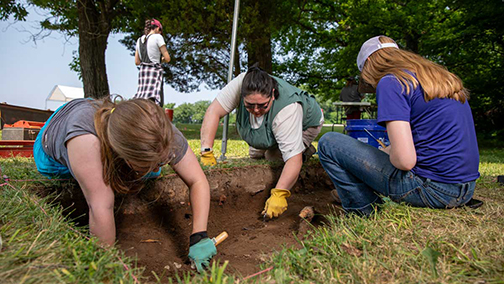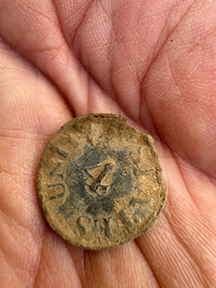by Pete Rosenbery
CARBONDALE, Ill. — Students from three universities, including Southern Illinois University Carbondale, continue to unearth important information about the French and American forts once visited by the Lewis and Clark Expedition by participating in the annual Archaeology Field School at the Fort Kaskaskia State Historic Site in Randolph County.

SIU Carbondale’s Archaeology Field School, like students in the 2023 class, continue excavating an area where the American Fort Kaskaskia once stood in Randolph County. (Photo by Carson VanBuskirk) (Below) One of the discoveries this year is an early 1800s U.S. Army Fourth Regiment uniform button. (Provided photo)
Research work at the seventh annual field school has been underway since May 20 and will continue through June 28. Mark Wagner, director of the SIU Center for Archeological Investigations and a professor in anthropology, said a goal for this year’s field school is to find the location and plan of a fort built by U.S. Army soldiers more than four decades after French soldiers built the original Fort Kaskaskia “so that it can be protected for future generations.”
Participants are also searching for “additional artifacts that will help us tell the story of the fort,” Wagner said. So far, students attending this year’s field school have discovered uniform buttons and other items belonging to soldiers who once lived at the fort and a pit that may have been used to store vegetables.

Historians long believed that Fort Kaskaskia served as a fort for both 1750s French and early 1800s American troops. The most prominent event in the fort’s history was a visit by the Lewis and Clark Expedition in 1803 to recruit 12 soldiers — including U.S. Army Sgt. Patrick Gass, who documented the expedition — for the group to explore the American West. But in 2017, after two seasons of work, the team of SIU archaeologists and students concluded that, in fact, two separate forts — one French and one American — were constructed near each other — and separated in time by 45 years. Wagner said the American fort was active from 1803-1806 and passed almost immediately from memory when it was no longer needed.
Both Fort Kaskaskia I and II are located within the boundaries of the French National Heritage area in Illinois that has been proposed in Congress, Wagner added.
“Our work at Fort Kaskaskia helps strengthen that nomination by demonstrating the types of archaeological information regarding the early history of the United States that can be recovered from sites within that area,” he said.
“It represents a window into the past with the artifacts we are recovering, providing information regarding the types of clothing items and tools carried by the men of the expedition. The previously unknown fort, Fort Kaskaskia II, represents a new addition to American heritage in the state of Illinois.”
The 14 college-level students involved in field school activities this summer are:
Southern Illinois University Carbondale
Graduate program
- Hunter Bullard, undeclared, master’s student.
- Rebecca Ramey, history, master’s student.
- Kamden Summers, anthropology and U.S. Department of Agriculture archaeologist, master’s student.
- Paulo Vitor Mendes Da Cunha, anthropology, master’s student.
Undergraduate students
- Carmela Cesario, senior, anthropology.
- Hunter Colman, senior, political science.
- Tanner Ferris, senior, political science.
- Zoe Milam, junior, anthropology.
- Viktor Rhyce, sophomore, anthropology.
- Brenda Smith, senior, university studies.
- Heather Wessel, junior, anthropology.
Murray State University: Miranda Stapleton, undergraduate student, anthropology.
Western Kentucky University: Todd Clemmons, undergraduate student, anthropology.
Wagner said he hopes the students in this year’s field school learn “the importance of archaeology in uncovering the forgotten history of the United States and its importance in uncovering information regarding the lives of past Americans.”
